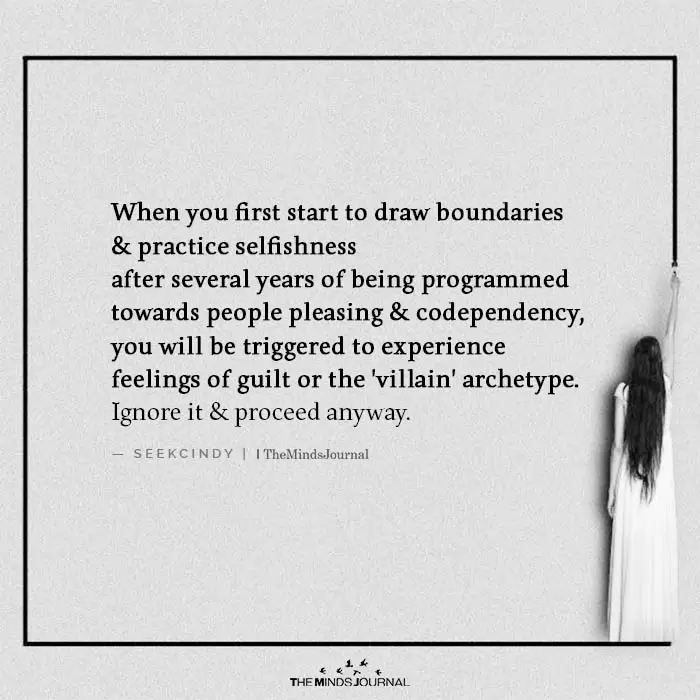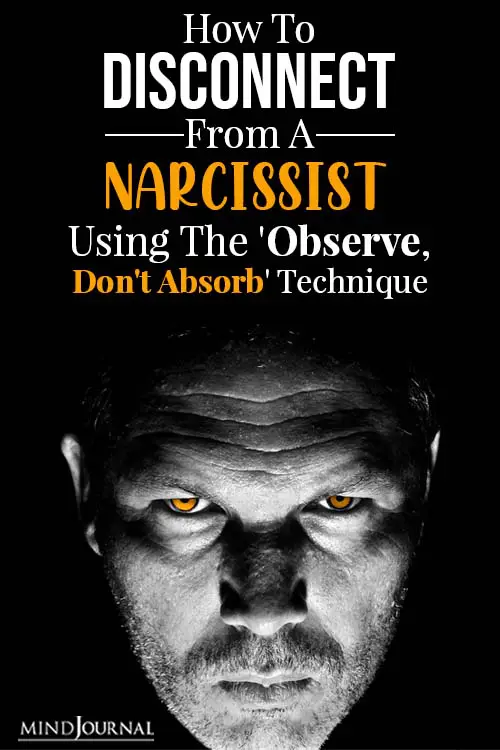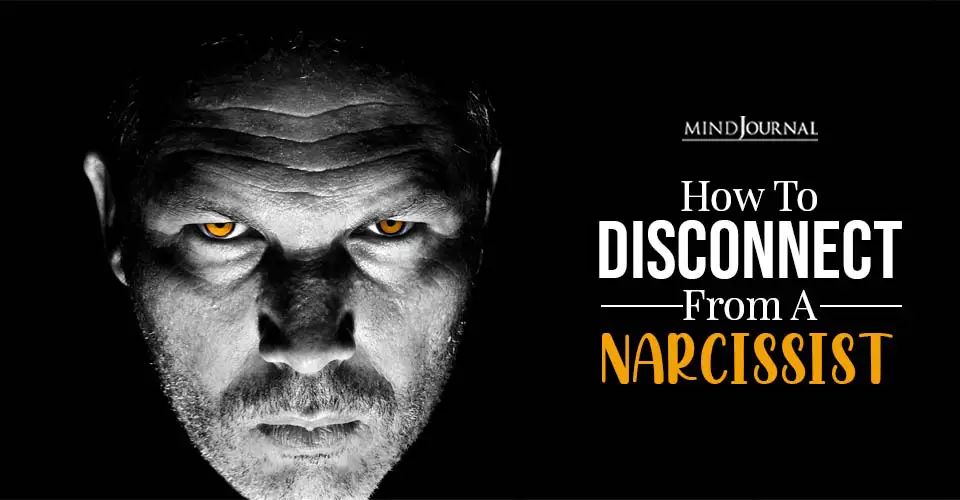Being in a codependent relationship with a narcissist is nothing short of a hellish and nightmarish experience, but there is one technique that can really be effective when it comes to disconnecting from a narcissistic person.
After spending years trying to understand my own relationships with narcissists, as well as working with clients for over 30 years, I developed a technique called Observe Don’t Absorb.
The technique was influenced by a saying from George Bernard Shaw who said, “Never wrestle with a pig, you get dirty, and besides the pigs like it.” I immediately saw the connection between the quote and how codependents always lose their battle with a narcissist.
So, where does that leave you, the codependent?
Related: How Narcissists Control You: 11 Techniques They Use
What The Codependent Has To Learn
As a therapist, my goal is to help codependents understand that when they start wrestling with their proverbial ‘pig’, they will always be powerless and disadvantaged because narcissists thrive on power. Their entire goal is to bate you into conflict, argument, and a verbal wrestling match. Why? Because that is where they know how to control and influence their codependent.
Codependents have to learn that stepping into the world of the narcissist is analogous to ingesting toxins.
How does this help the codependent? Because it equates a relationship with a narcissist to something that will make you sick. When we drink something toxic, we feel ill.
Similarly, when we let the narcissist bring us into their world, we lose our emotional control. Narcissists pull codependents into emotional altercations. As experts, they simply always win by sucking you into their argumentative, aggressive, and manipulative world.
I ask my clients to consider that relationship a toxic environment. One where you easily lose your perspective and abandon self-care.
What Is The Observe Don’t Absorb Technique?
The Observe Don’t Absorb technique allows the codependent to maintain control and I call it Observe Don’t Absorb as I teach my clients to artificially detach from the narcissist. The goal is to watch or observe the narcissist. As they do, they are not connecting effectively or emotionally to them. They are simply observing.
Conversely, when they absorb, they are participating in the dysfunctional interaction and lose control and can no longer properly protect themselves or set healthy boundaries.
In essence, this is a healthy disassociation. It is purposeful emotional detachment, and it helps neutralize the narcissist power to control them.
With this technique, we refuse to allow the manipulator to get under our skin. We won’t absorb the toxins and cannot be pulled into their emotional world becoming a victim of it.
It is like if we picked up a bottle of poison. There is no danger in holding or looking at a bottle of poison. But the moment we pop off the lid and ingest it, we are doomed. We respect its pathological power, but we are not tainted by it.
Related: Narcissists And The Codependency Dance
Examples Of How To Use The Observe Don’t Absorb Technique
So, these are some examples or instructions that I use to help my clients use the Observe Don’t Absorb technique.
First, I explain the wrestling with a pig analogy above. I clearly outline how they can practice observing, not absorbing, and how that gives them an advantage.
One way they can implement this technique is by pretending, during interactions with their narcissist, that they are an observer. I ask them to envision themselves wearing a white research coat and watching the person. We then explore how doing so helps them disconnect emotionally from the narcissist.
I then point out they can observe with curiosity and wonderment. “Can you see how dysfunctional they are?” I ask. “How manipulative they are? Now recognize how incapable they are of manipulating you from this position if you don’t react.” The key to my instruction is to watch and listen, never react.
Another way to implement this is to imagine you are watching an instructional video that depicts the narcissist. “What you’re watching is a video of the typical symptoms of Narcissistic Personality Disorder,” I tell them.
I ask them to look for the manipulative strategies that the narcissist is using to pull them into the fight. Examine the person from head to toe. Watch their facial reactions, body posture, etc. Recognize this is a person with psychological problems who are trying to manipulate you. The more you can step outside of the reaction and just observe, the more power you have.
In real-time, I encourage my clients to practice trying to see what the person is doing right now to get a reaction out of them. The more they can answer that question, the more they can remain in a neutral position and stop absorbing the narcissist’s toxins.

Bonus Ways To Observe Not Absorb
Another suggestion I have for codependents is to repeat an affirmation to themselves like, “I am strong and in control.” I highly recommend repeating that affirmation over and over during these touchy moments.
Reminding codependents why this is important is also powerful. Doing this technique ensures that the narcissist cannot control them, they won’t fall victim, and they will remain in control and secure their boundaries.
A few other helpful suggestions include keeping an even tone, low volume, and breathing deeply. This is critical if you want to stay detached from the argument. It also helps you stay relaxed and reduces any power being given to the narcissist. Staying connected to your body also prevents you from absorbing toxins leading to stress and anxiety.
Related: Changing Codependent Dynamics in Abusive Relationships
Detachment is a powerful tool for codependents. And you should be proud of how healthy you are and stay as disconnected as possible from a narcissist.
Use the Observe Don’t Absorb technique whenever you like and start taking your power back!
Ross Rosenberg M.Ed., LCPC, CADC, is the owner of Self-Love Recovery Institute. He is a psychotherapist, educator, expert witness, and author. Ross is known globally for his expertise in codependency (Self-Love Deficit Disorder™), Pathological Narcissism, Narcissistic Abuse, and Trauma Treatment. He is a keynote speaker and educator who has presented in 30 States/70 cities and abroad. Ross has been regularly featured on national TV and radio. His “The Human Magnet Syndrome” books sold over 120K copies and are translated into 10 languages. His YouTube Channel has amassed 19 million video views and over 200K subscribers.
Written By Ross Rosenberg Originally Appeared In Human Magnet Syndrome









Leave a Reply
You must be logged in to post a comment.